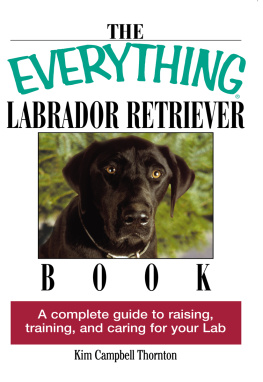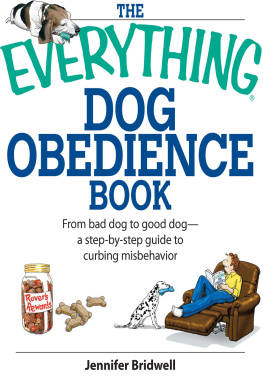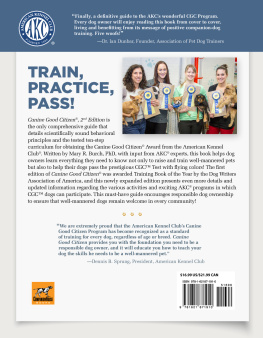Ruth Strother, Editor-at-Large
Michelle Martinez, Editor
Michael Vincent Capozzi, Designer
Reprint Staff:
June Kikuchi, Vice President Chief Content Officer
Roger Sipe, Special Projects Editor
Jarelle S. Stein, Editor
Karen Julian, Publishing Coordinator
Tracy Burns, Jessica Jaensch, Production Coordinators
Copyright 2003 by I-5 Press
Illustrations copyright 2003 by Buck Jones
All rights reserved. No part of this book may be reproduced, stored in a retrieval system, or transmitted in any form or by any means, electronic, mechanical, photocopying, recording, or otherwise, without the prior written permission of I-5 Press, except for the inclusion of brief quotations in an acknowledged review.
The Library of Congress has cataloged an earlier printing as follows:
Thornton, Kim Campbell.
Simple solutions : obedience / by Kim Campbell Thornton ;
illustrations by Buck Jones.
p. cm.
ISBN-10: 1-931993-09-2 (pbk. : alk. paper)
ISBN-13: 978-1-931993-09-8 (pbk. : alk. paper)
eISBN: 9781620080719
1. DogsTraining. 2. DogsBehavior. I. Title.
SF431.T534 2003
636.7'0887dc21
2003004492
I-5 Press
A Division of I-5 Publishing, LLC
3 Burroughs
Irvine, California 92618
Printed and bound in China
13 12 11 10 7 8 9 10
Contents
Petiquette for Pooches
Some dogs wouldnt dream of challenging their people, while others are gunning for the top spot from the first day they walk into the house. Its important to know your dog and to establish yourself as her leader early on in the relationship. Not by being mean or bossy to the dog, but by being consistent in all your actions so she learns to work with and respect you.
The formal training of puppy kindergarten and obedience school are only one step toward teaching your dog to become a civilized member of the family. Classroom training is important, but it isnt enough to ensure that your dog becomes a successful member of human society.

In addition to classroom training, dogs need plenty of interaction with the world around them, a process known as socialization. Rewards, such as praise and treats, when they do the right thing (so they know to repeat those desirable behaviors); an understanding of their place in the family pack; andas with all lessons throughout lifepractice, practice, practice are key in socializing your dog.
Because every human family is different, we all have different behaviors we want to teach our dogs. Nonetheless, the obedience lessons covered here will help your dog to be welcome both in your home and in public places.
Whos the Boss?
Teaching manners is important not only for harmonious living, but also to establish yourself as your dogs leader. When dogs live together they have a pack leader who decides when everyone eats and how much they get; where everyone sleeps; when playtime begins and ends; what kind of play will take place; what to investigate on the trail; and so on. Now that your dog lives with you, he needs you to be the pack leader and make those kinds of decisions for him. If you dont, hell try to take over the role himself, and thats not good.

Part of establishing leadership is teaching your dog to obey commands and how to behave in the house and around people. Be firm but not harsh. Avoid using discredited techniques such as alpha rollsforcing the dog onto his back and staring at himwhich are dangerous and ineffective. Instead, be consistent with what you ask of your dog and insist that he complyas long as youre sure he understands what you want.
The Social Graces of the Urbane Dog
A happy, confident dog loves meeting people, plays well with other dogs, acts politely toward cats, and shows curiosity rather than fearfulness when encountering unfamiliar objects. When a dog has these attributes, shes said to be well socialized. A well-socialized dog isnt born, though; shes made. Theres no doubt that a dogs personality is important, but unless you make the effort to introduce Duchess to all kinds of people, places, and things at an early age, she will never reach her full social potential, and that would be a shame.

The critical period in a young pups life is from three to fourteen weeks of age. Thats when her brain is most open to new experiences. Older dogs benefit from socialization as well. It may take them a little longer to become accustomed to new things, but they can learn. Socialize them the same way you would a puppy. Remember, the most important factors that contribute to the making of a happy, confident dog are socialization and an understanding of her place within her human family.
For a well-adjusted dog, expose your pup in a positive way to people of all ages and appearances: people wearing hats or glasses; people on skateboards and bicycles; and people using wheelchairs or walkers. Introduce her to the sounds of vacuum cleaners, lawn mowers, electronic toys, and any other noises she may commonly encounter.
Take Duchess to public places where dogs are welcome such as parks, pet supply stores, andof coursethe veterinary clinic and grooming shop. A lot of places permit well-behaved dogs, so keep it that way by taking your dog on leash and controlling her behavior in public.
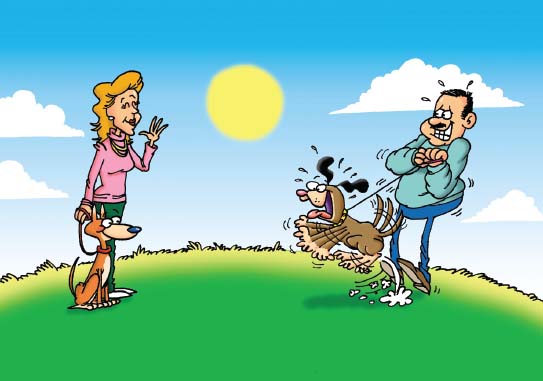
Your attitude is the key to a confident dog. If Duchess sees that youre relaxed about a persons approach or a noise thats being made, she will follow your lead. Conversely, if she senses that youre anxious, shell become anxious herself.
The veterinary clinic is a great place to start socializing your dog. Schedule an appointment for an exam or weight check onlyno painful needles, please! Walk your dog into the clinic with a smile on your face, and let the staff greet her with pats and treats. If she seems fearful, dont try to soothe her by crooning that its okay. That simply confirms her belief that something awful awaits her. Just ignore her. Let her explore at her own pace; dont pick her up or force her toward staff members. Praise her when she investigates on her own, and ignore her if shes cowering under a chair. When Duchess is being brave, or at least calm, praise her and give a treat. Repeat these just-for-fun vet visits as often as possible; theres no charge for bringing your dog to the clinic to be weighed and then giving her a treat.
Use this same technique anytime you take Duchess someplace new or introduce her to someone. Keep treats on hand so strangers can give one to Duchess when they meet. If your dog is reluctant to approach a new person, lay a trail of treats to him or her so Duchess can move toward the new person graduallynot to mention happily.
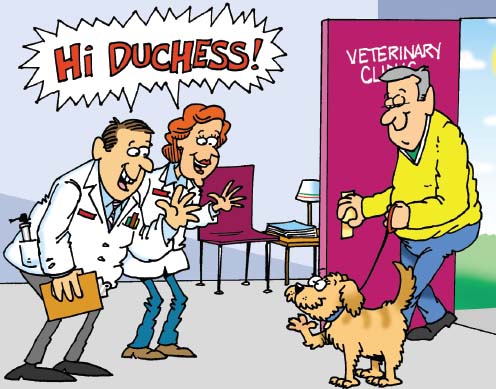
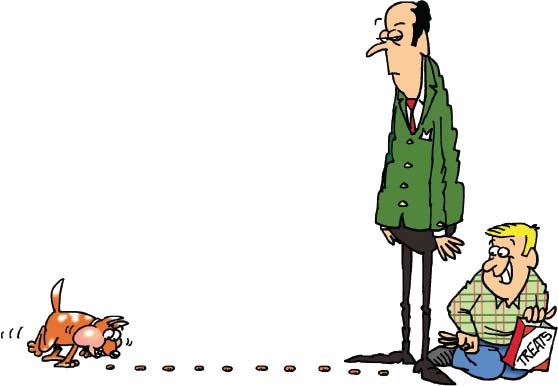
And remembernever force your dog to go toward someone: Fearful dogs bite! This advice applies to both large and small dogs. In fact, its even more important for small dogs, because our first instinct is to pick them up and cuddle them. Dont do it. Small dogs need to develop confidence just as much as large ones domaybe even more so.
Next page

